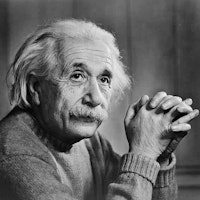A human being is part of the whole, called by us ‘universe,’ a part limited in time and space…
A human being is part of the whole, called by us ‘universe,’ a part limited in time and space…
Albert Einstein

Part of the Whole
Topic: Immanence & Transcendence
A human being is part of the whole, called by us ‘universe,’ a part limited in time and space. He experiences himself, his thoughts and feelings, as something separate from the rest—a kind of optical delusion of consciousness. This delusion is a kind of prison for us, restricting us to our personal desires and to affection for a few persons nearest to us. Our task must be to free ourselves from this prison by widening our circle of compassion to embrace all living creatures and the whole of nature in its beauty.
Albert Einstein, born on 14 March 1879 and passing away on 18 April 1955, stands as one of the most renowned theoretical physicists in history. Best known for his groundbreaking special and general theories of relativity, his scientific endeavors spanned a multitude of areas within the field of physics. Amongst his numerous accolades, he was awarded the Nobel Prize in physics for his elucidation of the photoelectric effect—a phenomenon that expanded the horizons of quantum theory.
Einstein's journey, however, wasn't merely defined by scientific discoveries, but by the myriad challenges he overcame across various dimensions of his life. In his spiritual journey, he grappled with the concepts of God and universe. Socially, he navigated the complexities of his time—facing the rise of anti-Semitism, experiencing exile from his homeland due to Nazi oppression, and advocating for civil rights, disarmament, and global peace. These adversities only strengthened his resolve and underscored his resilience.
Beyond his professional accomplishments, Einstein's life was enriched by a tapestry of relationships and dialogues with luminaries from diverse fields. He engaged in profound conversations on the nature of reality with the likes of the Indian poet Rabindranath Tagore, discussed the principles of non-violence with Mohandas Gandhi, and deliberated on humanitarian issues with Albert Schweitzer. Furthermore, his camaraderie with fellow scientists and physicists provided a fertile ground for intellectual exchanges, fostering an environment of collaboration and innovation during one of the most exciting epochs in scientific history.
Easwaran, Eknath. Words to Live by: Short Readings of Daily Wisdom. Nilgiri Press, 2010, p. 336.

Albert Einstein
Theme: Intimate Divinity

About This Albert Einstein Quotation [Commentary]
Albert Einstein begins with a clear insight: “A human being is part of the whole, called by us ‘universe,’ a part limited in time and space.” Though we belong to this greater whole, we often “experience [ourselves], [our] thoughts and feelings, as something separate from the rest.” This is not a minor misunderstanding but, as he writes, “a kind of optical delusion of consciousness.” The illusion of separateness—while deeply embedded in human perception—is not the truth of who we are. Einstein’s phrase “optical delusion” suggests that what appears real to the mind and senses may obscure the deeper unity of life.
The consequences of this delusion are not abstract. Einstein writes, “This delusion is a kind of prison for us,” one that confines us “to our personal desires and to affection for a few persons nearest to us.” The illusion leads to limitation. Rather than seeing ourselves as part of a living whole, we narrow our concern to what seems directly ours. Einstein names this as a restriction, not only in thought but in compassion. He does not condemn human attachment but points to its incompleteness when shaped only by separation.
To move beyond this prison, Einstein writes, “Our task must be to free ourselves… by widening our circle of compassion to embrace all living creatures and the whole of nature in its beauty.” This widening is not sentimental. It is a call to live in alignment with the truth that we are not separate from the universe. In this, we find a kind of everyday divinity—not in reaching beyond the world, but in fully seeing and responding to the life we are already part of. Einstein does not urge withdrawal from experience but deepened engagement, grounded in a clearer view of who we are and what we belong to.
Naomy Levy About This Albert Einstein Quotation
Albert Einstein used a different formulation of the above featured passage in a letter to Rabbi Robert S. Marcus:
“A human being is part of the whole, called by us ‘universe,’ a part limited in time and space. He experiences himself, his thoughts and feelings, as something separate from the rest—a kind of optical delusion of consciousness. The striving to free oneself from this delusion is the one issue of true religion. Not to nourish the delusion but to try to overcome it is the way to reach the attainable measure of peace of mind.”
—Albert Einstein [Naomi Levy, Einstein and the Rabbi: Searching for the Soul, MacMillan] pp. 22-23.
Eknath Easwaran About This Albert Einstein Quotation
None of us see life as it is, the world as it is. We all see life as we are. We look at others through our own likes and dislikes, desires and interests. It is this separatist outlook that fragments life for us—man against woman, community against community, country against country. Yet the mystics of all religions assure us on the strength of their own experience, if only we throw away this fragmenting instrument of observation, we shall see all life as an indivisible whole.
—Eknath Easwaran [Words to Live By, Nilgiri Press, 2005] p. 336.
Resources
Related Quotes
Copyright © 2017 – 2026 LuminaryQuotes.com About Us